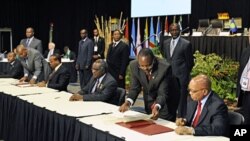A SADC summit in Johannesburg urged Zimbabwe's political rivals to move faster to resolve differences.
The Southern African Development Community called for South Africa, Zambia and Mozambique to appoint officials to a team to assist implementation of the country's power-sharing agreement.
The multi-party Joint Monitoring and Implementation Committee, assisted by representatives from South Africa, Zambia and Mozambique has been charged with working out time frames for full implementation of the 2008 Global Political Agreement by the next SADC summit in August.
SADC also said President Robert Mugabe's ZANU-PF party and its partner in the unity government, the Movement for Democratic Change, should work harder to create an environment for free and fair elections.
The SADC summit did not submit to Mr. Mugabe’s request to review or retract a statement critical of ZANU-PF's political behavior that SADC members released during a March summit in Livingstone, Zambia
That statement blamed ZANU-PF for political violence and slow implementation of the 2008 political agreement.
Movement for Democratic Change Secretary General Tendai Biti said he was pleased the statement had been adopted.
But ZANU-PF Foreign Minister Simbarashe Mumbengegwi denied that the March report was endorsed by the summit. He said the wording in the final SADC communiqué was “noted” not “adopted.”
Headlines in the ZANU-PF-aligned state newspaper, The Herald, declared the SADC summit had ‘rejected” the resolutions.
After the summit, SADC’s executive secretary, Tomaz Salomao, said the statement in Livingstone was “final.” He said no one had the mandate to change the March communiqué, which Mr. Mugabe admitted at the time had shocked him.




